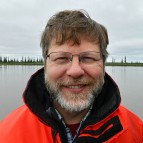
Christopher Burn
Professor
| Degrees: | B.Sc. (Durham), M.A. (Carleton), Ph.D. (Carleton), P. Geo. |
| Phone: | 613-520-2600 x 3784 |
| Email: | Christopher.Burn@carleton.ca |
| Office: | A330 Loeb Building |
Biography
Chris Burn held an NSERC Senior Northern Research Chair at the Department of Geography and Environmental Studies from 2002-12, throughout the program’s life. He came to Canada in 1981 as a Commonwealth Scholar, and completed both the M.A. (Geography, 1983) and Ph.D. (Geology, 1986) at Carleton. He then moved to U.B.C. as a Killam fellow, to study with J.Ross Mackay, the world authority in his field. In 1989 Chris was awarded an NSERC University Research Fellowship, which he brought back to Carleton in 1992.
Chris is committed to long-term field investigations of frozen ground. His research is focused on the relations between climate and permafrost. He has been particularly interested in determining the response of ground temperatures and the active layer to climate warming as observed in the western Arctic since 1970. His program involves partnerships with several northern agencies, particularly AANDC, Yukon Parks, Parks Canada, the Village of Mayo, Yukon and Aurora Colleges, the City of Dawson, and the Departments of Transportation in Yukon and NWT. Dr Burn has been involved with the environmental and regulatory reviews of several northern projects, including the proposed Mackenzie Gas Project and, most recently, the Inuvik-Tuktoyaktuk Highway.
His research program strives to provide explanations for the behaviour of permafrost terrain that are founded in field verification of physically based models. Projects completed and in progress at Herschel Island relate the present ground thermal regime to climate change over the past 120 years. Fieldwork there has also shown how temperatures inside an ice cellar at Pauline Cove allow comparison between convective and conductive heat transfer. Long-term observations at the Illisarvik drained lake field experiment build on Dr Mackay’s work, and have just given an uninterrupted 30-year record of active-layer development that may be the longest in North America. Ground temperatures collected at Illisarvik confirm the effect of regional warming in winter on summer thaw depth. In central and southern Yukon data collection is primarily concerned with the effect of changes in surface conditions on ground temperatures, especially following forest fire in Takhini River Valley, near Whitehorse, and after thaw slumping, near Mayo. Graduate student projects are woven into the general program that covers these themes.
The work is supported by NSERC, PCSP, the Aurora Research Institute, Transport Canada, and AANDC. Northern agencies also provide critical assistance, especially the Village of Mayo, Herschel Island Qikiqtaruk Territorial Park, and Tuktut Nogait National Park. Since 1992, 18 Master’s and three PhD theses have been completed in the program, with three Ph.D. theses and four M.Sc. projects underway.
Chris has served as Chair of NSERC’s Committee 186 (Scholarships and Fellowships Committee for Ecology and Earth Sciences, 2010); as Chair of the Canadian Northern Studies Trust Northern Science Committee for adjudication of Weston Awards for Northern Research (2007-11); as Vice-President of the Royal Canadian Geographical Society (2004-09); and President of the Arctic Circle (2009-12). Until November 2013 he will be Co-Chair of Transport Canada’s Network of Expertise in Northern Transportation Infrastructure Research. He is on the editorial board of Permafrost and Periglacial Processes, and in 2012 was guest editor of a special issue of the Canadian Journal of Earth Sciences devoted to Fundamental and Applied Research on Permafrost in Canada.
In 2012 Chris edited a 242-page, multidisciplinary account of the natural and cultural history of Herschel Island, Herschel Island Qikiqtaryuk. The book is a partnership with 12 supporting agencies, involving 43 authors, 24 of whom live north of 60°. It is lavishly designed and carefully copy edited to be accessible to a broad audience, ranging from community members to graduate students beginning their program.
Recent Awards
- Queen Elizabeth II Diamond Jubilee Medal for service to the Royal Canadian Geographical Society. April 2012.
- Permafrost and Periglacial Processes Prize for Excellence in Permafrost and Periglacial Research. June 2012.
- Inaugural Yukon North Slope Conservation Award, Wildlife Management Advisory Council (North Slope). October 2012.
Research Interests
- Permafrost and ground ice
- Physical Geography of Yukon and Northwest Territories
Current Research Projects
- Assessment of soil carbon in permafrost, western Arctic Canada (Marcus Phillips, Ph.D. student; NSERC funded)
- Permafrost conditions near the Dempster Highway (Brendan O’Neill, Ph.D. student; NSERC funded)
- Influence of lakes on permafrost conditions in the Old Crow Flats (Pascale Roy-Roy-Léveillée, Ph.D. student; IPY and NSERC funded)